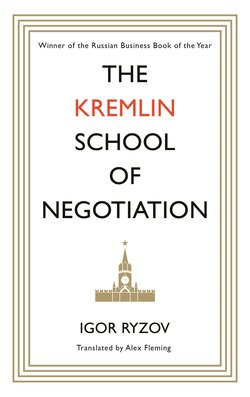Читать книгу The Kremlin School of Negotiation - Igor Ryzov - Страница 7
На сайте Литреса книга снята с продажи.
ОглавлениеINTRODUCTION
I am sure we all have a clear memory of the things we enjoyed doing when we were little kids; as we grew up; when we got our first student cards . . . Well, when I was a student I, like many of my friends and classmates, took up karate. It was an exciting sport with a certain prestige, and besides, damnit, I was a man! You can probably picture how our training sessions looked: a giant sports hall, a coach teaching kids specific moves, skills and techniques. Of course, there was one golden rule: no fighting in the streets. We’d spar, of course, but within the sports hall contact was always limited – it was something dangerous, forbidden. Even so, we could (and generally did) consider ourselves successful fighters: after all, we took part in meets and workshops, went to sports camps, learned and perfected new moves, showed off our skills at various competitions – which we won, of course, earning ourselves belt after belt. So we were justified in thinking we were serious fighters. We had complete confidence in our skills and in ourselves. However, one very banal event put us all back in our place.
Late one night, me and the guys were on our way home from practice. Three kids that looked like bad news came up to us and asked us for ‘a smoke’. Now, in that sort of situation, a request for ‘a smoke’ never feels completely harmless; it was fairly reasonable for us to expect it to be followed up with some trick straight out of the playbook. But hey, we did karate, we weren’t about to let them scare us! So what did we do? You guessed it. Without the slightest doubt in our own professionalism, we immediately decided to fight. Of course we did: we were sportsmen, we had mastered a true martial art – we definitely had the upper hand. On paper, that is. But.
Yes, there was a ‘but’. And it turned out to be pretty decisive. You can probably guess that our calculations came up short. We got whipped. Pummelled, even. I’ll be honest, it was a big knock, both physically and emotionally. Those street thugs turned out to be way faster and stronger than us. And although they had nothing on us when it came to our training in specialist combat techniques, we didn’t even get a look-in.
Turns out, a street thug is stronger than any sportsman trained in a sports hall. Why? Well, while a sportsman may have specific skills and training, they’ll be lacking experience of hand-to-hand contact. The real fighter to be reckoned with is the one who not only has a perfect mastery of technique, but who also knows the tricks used on the street.
Reader, take note: never underestimate street tricks. Theory may tell us they shouldn’t work, but, more often than not, in practice they do – and how! We were just kids, still so inexperienced. We underestimated the strength of the street.
Where am I going with these reminiscences, you may ask? Surely I’m not suggesting that, instead of their fists, these poor karate kids should have solved the problem with some skilled negotiations? That is what this book’s about, right?
Yes, this book is about negotiation. But it’s mainly about how you negotiate. When entering into negotiations, you are essentially engaging in combat. Of course you need to know what theory suggests is the right course of action. But you also need to know how to hold your own against the ‘street fighters’ who won’t play by the same rules.
The book you hold in your hands brings together a number of scholarly approaches employed in negotiations today. But it also contains a wealth of life experience, amassed over years of leading negotiations – in business as well as in life, with public authorities and the business community alike.
